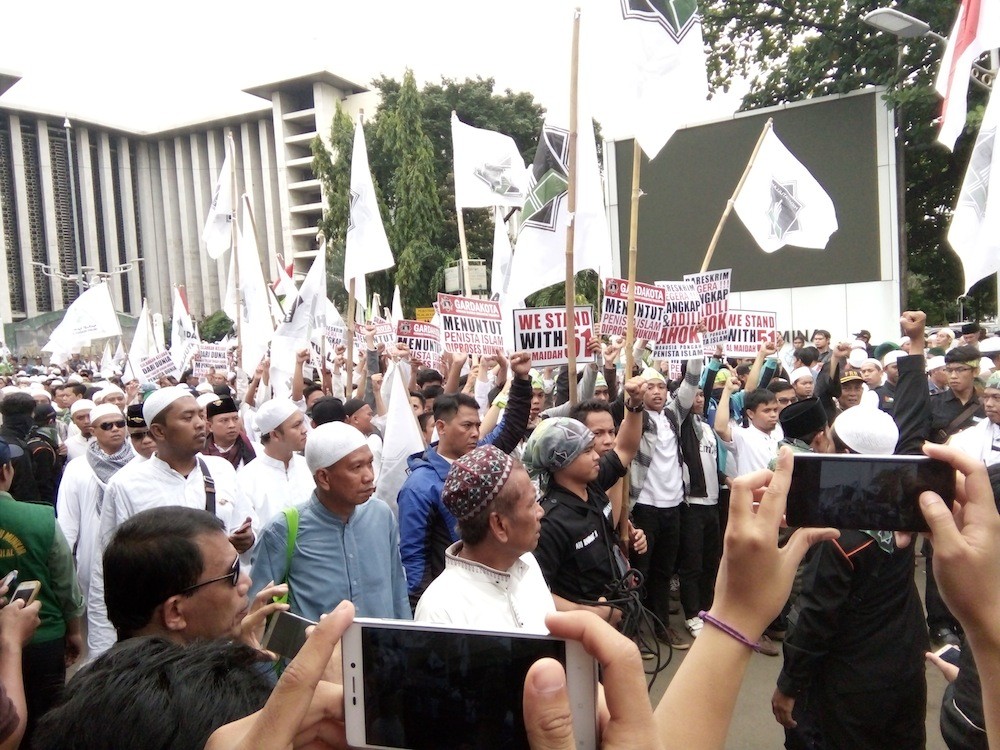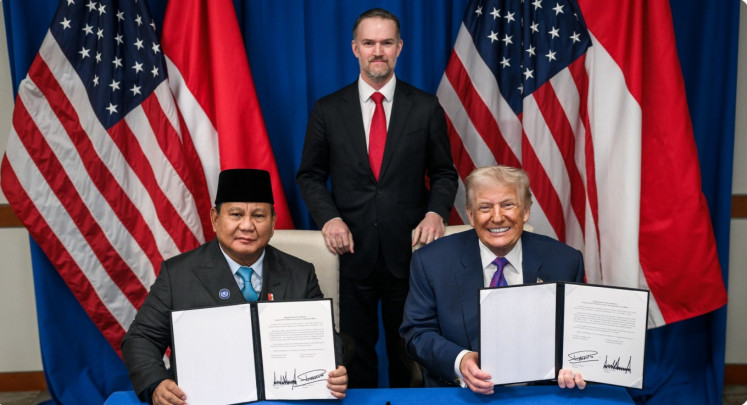Popular Reads
Top Results
Can't find what you're looking for?
View all search resultsPopular Reads
Top Results
Can't find what you're looking for?
View all search resultsIndonesian Muslims’ religious arrogance
Change text size
Gift Premium Articles
to Anyone
 Thousands of members of hard-line Muslim groups gather for a protest march after Friday prayers on Oct. 14 at Istiqlal Mosque in Gambir, Central Jakarta, demanding the police to continue the legal process against Jakarta Governor Basuki "Ahok" Tjahaja Purnama, who is accused of blasphemy. (JP/Callistasia Anggun Wijaya)
Thousands of members of hard-line Muslim groups gather for a protest march after Friday prayers on Oct. 14 at Istiqlal Mosque in Gambir, Central Jakarta, demanding the police to continue the legal process against Jakarta Governor Basuki "Ahok" Tjahaja Purnama, who is accused of blasphemy. (JP/Callistasia Anggun Wijaya)
T
he more I observe the socio-political predilections of some Indonesian Muslims, the more I am convinced that what I am seeing mirrors the Evangelical Christian rights-defending Trump supporters in the US. The former’s accusation of blasphemy against Jakarta Governor Basuki “Ahok” Tjahaja Purnama is one case in point.
What started as Ahok’s expression of disappointment to those who twisted the literal interpretation of verse 5:51 of the Quran and used it against him, led to widespread belief that the governor had committed blasphemy against Islam’s holy book, and hence Muslims.
Eventually Ahok apologized to Muslims for his statement.
The problem here is that rather than to see the Quran as a scripture to be studied, some Indonesian Muslims take the Quran as a relic so fragile that it needs to be defended at all cost.
It naturally follows then that every single “inappropriate” statement about the Quran will taint its authenticity unless some selfstyled religious gatekeeper comes to the rescue.
However, the truth is that the Quran has always been a colorful “enterprise”, a “fluid space” in which various readings take place and interpretations have been built upon specific times and spaces.
Otherwise, how can a 7th century revealed scripture have anything to say within our 21st century life without inherent elasticity within it?
Of course some will say just exactly that is what those literal readings mean. If I can read the Quran within the pluralistic framework of the 21st century Indonesia, then why cannot others read it in the fashion of 7th century Hijaz? Here is why: a literal reading of the Quran contradicts its universalist spirit.
This is a scripture that was sent down for all of humanity but was revealed in a specific historical context.
Hence, whatever forms of interpretation we employ to understand the Quran must not be in opposition to its mission to provide guidance for humanity, and not in any way dismisses the historical context within which it was revealed.
This is what happened to the interpretation of verse 5:51 that prescribes Muslims to only live under the leadership of another Muslim.
The reading anachronistically employed a political principle suitable for medieval Islamic period on to contemporary Indonesia that is politically and culturally diverse.
In addition, since any reading also brings with it values and sensibilities of its own time, the literal interpretation to verse 5:51 carries thick nuance of imperial Islam with its predilection to conquer.
In Indonesia, the inherent problem in what a literal reading of the Quran brings is compounded by a social subconscious that perceives Muslims as first-class citizens and the rest as sidekicks in national development projects.
Contrary to common opinion, this perception is not only within the domain of hard-liner Muslims, but is also present in mainstream elements of Indonesian Muslim society.
Another example from the current opposition to Ahok’s leadership of the Indonesian capital will make this clearer. The core resentment to oppose Ahok from retaining the governorship is not necessarily a religious one.
This is the case because there are not many Muslim figures for the seat who can prove that they are more capable than the ethnic Chinese-Christian Ahok in doing the job as the governor of Jakarta.
Yusril Ihza Mahendra failed to gain support from a coalition, whose members including two major Islamic political parties, which ended up supporting former president Susilo Bambang Yudhoyono’s son, Agus Harimurti Yudhoyono, a military officer who has zero experience in managing a cosmopolitan province as complicated as Jakarta.
While another major Islamic party, the Prosperous Justice Party (PKS), supports one of the richest men in Indonesia, Sandiaga Uno, who also does not have any experience in leading a megapolitan like Jakarta either.
This is why resentment of Ahok specifically comes from the fact that, first, he is an Indonesian of Chinese descent, and second he is a Christian.
When essential components of leadership such as capacity and experience to govern are missing from the equation, the only things left to employ are petty sectarian excuses such as race and religion.
The fact is that some of us Indonesian Muslims still are unable to place ourselves in an equal position with other non-Muslim, non-Javanese Indonesians.
We still think that we are more entitled over the country, and thus more capable to lead it, simply due to the fact that we make up the majority of society.
We are still stuck in the imperial mode of Islam in that we feel we need to limit non-Muslims political aspirations because otherwise they will make the country nonIslamic, hence the desperation in finding any Muslim wanting to take the lead despite his/her capacity to lead.
Well, guess what? Indonesia has never been an Islamic state in the first place and will never be one. Neither should it be a Christian, Hindu, or Buddhist country. Indonesia is ours, regardless of religion or race, ethnicity or tribe.
The writer is a Nostra Aetate fellow 2016 at the Pontifical Gregorian University, Rome.







